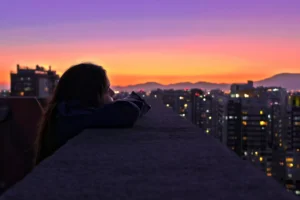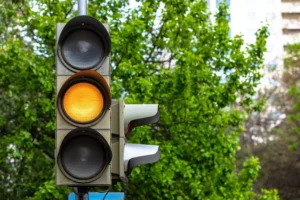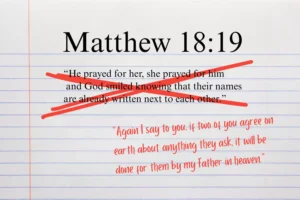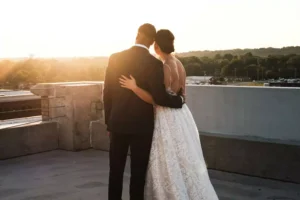I grew up with the kind of Christmas you see on a Victorian card. Snow falling in empty streets while lights glow in our windows. Six women baking cookies in our kitchen. Five sisters in sleeping bags under the tree, too excited to sleep. Three little brothers to wake us up at the crack of dawn for stockings. Sneaking the secret contents of our closets downstairs, anticipating the delighted look on this face, and that face, and wondering if we’ll make Daddy cry with joy this year. Reading the Nativity story before opening presents.
That all changed four years ago, when I became an overseas student. The only way to deal with homesickness, I felt, was to experience the holiday as I never could at home. In fact, it was the way I’ve dealt with three Christmases in the Holy Land.
Bethlehem knows it’s Christmas. The workers who strung a few miles of lights from the outskirts of Jerusalem to Main Street, Bethlehem — they know. The busloads of tourists, the Israeli border guards ushering them in, and the shopkeepers welcoming them — they know. So do the flocks of mischievous child beggars, the cavalcade of Palestinian dignitaries, the guys selling pointed hats in Manger Square, and the imported musicians with their nerve-shattering, head-banging imitation of classical music.
Someone in Bethlehem knows what Christmas really is. The few remaining native Christians who still brave Muslim persecution — they know. The hushed crowds of pilgrims at the Church of the Nativity on Christmas morning, and the little congregations singing carols in its ancient basements — they know. So does the person who hung a banner on their balcony: “Jesus is the reason for the season.”
Sometimes I wonder if Jerusalem knows it’s Christmas. Especially when I’m sitting in Hebrew class, and a fresh-faced American girl asks, “Why do Christians go to Bethlehem?”
Before I can answer, a streetwise cantorial student retorts, “Because that’s where Jesus was born!”
When I go Christmas shopping in Jerusalem, there’s not a flake of snow in sight: just people braving the steady rain and streaming sidewalks in their usual rush to finish errands before the weekend. My hands are getting cold and red, so I stop at a tiny store to buy some gloves. They are hung outside, under the awning, which does nothing to stop the wind from blowing rain down my neck. I settle my scarf more tightly around my head, and grab a pair of gloves. Ducking inside the shop, I encounter a middle-aged man with a kippa on his head. “Chag sameach!” he exclaims, as he rings up the sale.
“Todah,” I reply shyly, wishing my Hebrew reflexes were fast enough to wish him a happy Hanukkah in return.
I splash on down the street, smiling.
For Hanukkah, we had a guest speaker in language class. She wore a cloche hat, she brought a menorah, and she told us a story in simple Hebrew.
Hanukkah is the festival of light. It commemorates a time when the Temple, pagan-captured and defiled, was reclaimed by Jewish fighters, cleansed and rededicated. Sadly there was only a day’s supply of pure oil left for the light which was supposed to burn constantly there. What could they do? The story goes that the light miraculously kept burning and burning and lasted for eight days, long enough to make new oil.
The lady with the hat had another prop: a dreidel. This little top has four Hebrew letters, one on each side. Nun, gimel, hey, shin stand for “Nes gadol haya sham.” A great miracle happened there.
At Hanukkah, Jewish children use this little top to play a game of chance. Depending on which letter lands uppermost, they win (or lose) piles of chocolate coins.
“And it’s because of Christians,” Mrs. Be-hatted told us in mock indignation, “that we have to give our kids presents for Hanukkah!”
It’s because of the Jewish people that I know that a holiday can be a holy day, and still be rollicking good fun. I’ve been to a Passover Seder, where there’s so much liturgy, drama, food and family around the table that children ask, “Why is this night different from other nights?” It’s a night, like the weekly Sabbath, when God gives us permission to close the door on the frenzied demands of the outside world long enough to sense His presence.
Right in the middle of some of the most jubilant Psalms, an odd word has been inserted: Selah. It can be translated simply, “Pause, and calmly think of that.” When God set up the three pilgrim holidays, He bracketed them with Sabbaths, as if to say: “Enjoy, be festive — but stop for a while, and allow the meaning to sink in.”
When I get home from Christmas shopping in Jerusalem, it is almost sunset on the first day of Hanukkah. Excitement kindles inside me as I set my tree-shaped menorah in an arched living room window and light the first candle.
I curl up on the couch and watch it glow quietly all evening long.
Hanukkah is also called the Feast of Dedication. That light which kept burning so miraculously was the symbol of God’s presence, something that could not exist along with impurity. What a sense of relief for the Jewish fighters to know that once the Temple was clean, God could again dwell with them.
Jesus kept Hanukkah. While studying the book of John recently, I learned that at this feast He told His listeners that He is the one whom God has dedicated. Dedicated for what? For God to live in. After all, Jesus’ name is Emmanuel: “God with us.” But for God to visit visibly was such a rare thing that almost everyone missed it.
It wasn’t a new thing for God to do, though. In fact, John spelled it out right at the beginning of his story about Jesus, saying “God came down and tabernacled among us.” Tabernacled? When the children of Israel were on their big family camping trip in the wilderness, who came and pitched his tent next to them? God did.
But who would have guessed that God could come so quietly? “How silently, how silently the wondrous gift is given.” I think of that while I am watching snow fall. It is so quiet that sometimes I almost feel as if I’m breathing that quietness in and out. But a lot can happen in that quiet: drifts form, dirt is covered by white, roads are blocked and great cities are brought to a standstill.
Have you ever thought about how quiet light is? I did, while I was sitting there, watching my Hanukkah candle. If your eyes were closed, you’d never know it was there. John said, “The light came and the darkness didn’t even know it was there.” Didn’t matter, did it? Light still pushes back the darkness: That’s just part of light’s nature. Jesus did the job. “It is finished,” He said, and so it was, even though most of the world didn’t even know He was there.
In Israel, the Hanukkah dreidels are different. They say, “Nes gadol haya poh.”
“A great miracle happened here.”
Here, where the dimly burning wick of the Jewish nation was miraculously kept burning, here God came to be with us. Here the Light shone. Here our sins were covered once for all. All the indifference in the world cannot quench this lamp: the light is still shining. And already He is giving us eyes to see that light. Just as quietly as He came the first time, He comes to each of our hearts and knocks. “I want to be God — with you,” He says.
Pause.
And calmly think of that.
Copyright 2007 Elisabeth Adams. All rights reserved.











